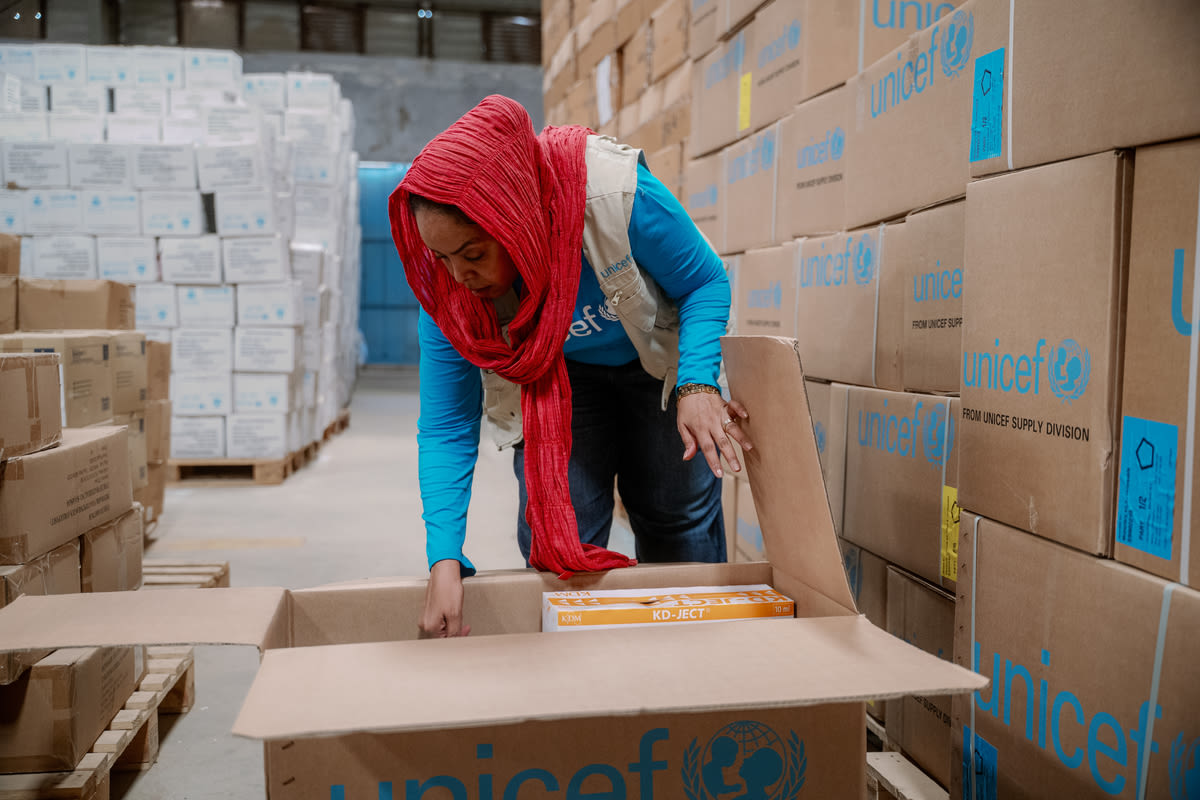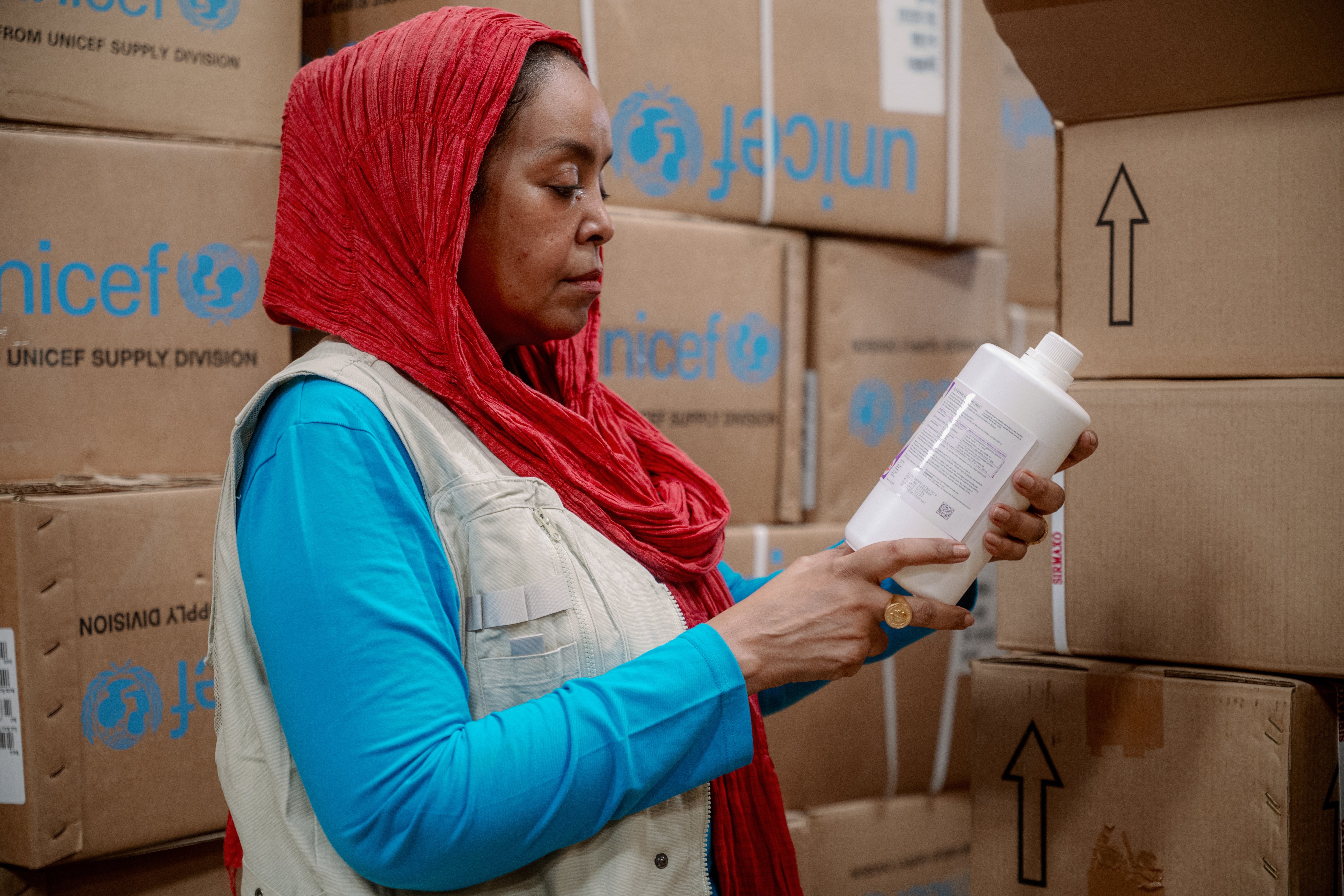
August 19, 2025
How a UNICEF Logistics Officer Directs Lifesaving Aid in Sudan
Tags:
August 19, 2025
This blog was originally published by UNICEF USA. Flexport.org and UNICEF have partnered since 2021 to expand timely access to critical aid in crisis-affected areas.
As Sudan’s brutal conflict enters its third year, the country faces one of the world’s largest humanitarian crises — and the largest child displacement crisis in history.
For 30 million people in urgent need, each day is a fight for survival. Nearly 15 million have been displaced within Sudan and across its borders, over half of them children, and almost one in three is under the age of five. Children and their communities urgently need support — and UNICEF and partners are stepping up.
UNICEF delivers life-saving supplies to help children survive, stay healthy, and keep learning. From the UNICEF Global Supply Hub in Copenhagen — the world’s largest humanitarian warehouse — UNICEF can reach even the most remote or crisis-affected areas within 72 hours, thanks to decades of expertise and a strong global partner network.
Since 2021, Flexport.org — the impact arm of Flexport — has partnered with UNICEF to overcome logistics challenges and speed delivery of critical aid. At the beginning of July, Flexport.org and UNICEF jointly organized two flights from Copenhagen to Port Sudan, transporting nearly 65 Metric tons of supplies including: Acute Watery Diarrhea medicine and community kits, midwifery kits, medical utensils, and hygiene kits for cholera response. After this latest shipment to Sudan, UNICEF USA and Flexport spoke with Shoshat Osman, UNICEF Sudan Logistics Officer, about the challenges of delivering aid and the urgent need to get supplies to children as quickly as possible.
Below is her invaluable insight from the front lines of this crisis.
Tell us about the humanitarian landscape in Sudan. What types of challenges are children and communities facing?
The humanitarian situation in Sudan is among the most severe in the world today. The country is grappling with a devastating conflict that has forced millions from their homes and pushed basic services to the brink of collapse. Entire communities—especially children—are bearing the brunt of this crisis. Families are facing widespread displacement, disease outbreaks like cholera, acute food insecurity, malnutrition, and the collapse of health and education systems. In some areas, access to clean water, food, or even basic healthcare is nearly impossible. For children, this means missing school, living in unsafe shelters, or falling ill from preventable diseases. In many parts of the country, humanitarian assistance is the only lifeline left.

Shoshat Osman, UNICEF Sudan Logistics Officer
What are the core components of your job? What does a typical day look like?
As a Logistics Officer, my role is to ensure that life-saving supplies—like malaria treatment kits, vaccines, midwifery kits, therapeutic foods, hygiene kits, and bed nets—reach the children and families who need them most, no matter how remote or insecure the location. I’m currently based in Port Sudan, where daily temperatures during the summer often soar above 45°C (113°F). The air is hot and dry, power outages are frequent, and the working conditions are both physically and mentally exhausting. But the urgency of the mission keeps us going.
A typical day? There’s really no such thing. I start with a plan, but the situation on the ground shifts constantly. One moment I’m tracking the movement of supply trucks or following up on customs clearance, the next I’m negotiating with authorities for travel permits or troubleshooting access issues at a border crossing. We coordinate across borders too—with teams in Chad, South Sudan, and elsewhere—because this crisis doesn’t recognize boundaries. It’s a 24/7 job where diplomacy, quick thinking, and persistence are crucial. Every hour counts when children’s lives are at stake.
What is the most difficult part about your role and getting aid cargo where it needs to be?
The most difficult part is access. In an emergency like this, conditions change by the minute. Key routes may be blocked without warning, permits delayed or denied. Even after receiving clearance, insecurity or damaged roads—especially during the rainy season—,can bring movement to a halt.
Sometimes we have only a very narrow window to deliver supplies. Missing it could mean that health kits or nutritional supplements don’t reach children in time. We succeed some days, and other days we don’t. But we never stop trying. Remaining neutral and impartial is also incredibly difficult in a conflict zone. We constantly have to remind all parties that our sole mission is to serve children—regardless of who they are or where they come from. That’s not always an easy conversation, but it’s a vital one.

Doses of oral cholera vaccine fill a UNICEF cooler box awaiting distribution to areas of Sudan affected by a deadly cholera outbreak.
What is the most complex portion of the import process right now?
Right now, the most complex part of the import process is customs clearance and transit. Air freight, while faster, is expensive for large shipments. On top of that, navigating bureaucratic procedures, ensuring documentation is in order, and avoiding costly demurrage fees all require constant coordination, follow-up, and adaptability. Even small delays in clearance can set back entire operations, which is why we have to stay on top of every detail.
How do you think humanitarian logistics differs from commercial logistics? How are they similar?
Both humanitarian and commercial logistics rely on meticulous planning, coordination, and tracking. Both face challenges like high transport costs, limited infrastructure, and security risks such as looting.
But humanitarian logistics operates in far more volatile and unpredictable environments. We move goods to save lives. That means responding to emergencies, adapting to access constraints, dealing with damaged roads, and negotiating with multiple authorities—all while under time pressure and resource constraints. In commercial logistics, delays can mean financial loss. In humanitarian logistics, delays can cost lives. As a Sudanese working in this context, I feel the weight of every delay, every roadblock—because I know what’s at stake on the other side.
What got you into the field of humanitarian work, and more specifically, humanitarian logistics?
I’ve always wanted to work in a field where I could make a real difference. During university, I joined a community initiative with friends and professors to respond to people’s needs during the rainy season. We used our own resources and networks to help flood-affected communities. That experience lit a fire in me. I didn’t begin my professional journey as a logistics officer. I joined the UN as an operations and administration officer, where part of my job involved supporting logistics. At first, I thought logistics was just about moving boxes. But I quickly realized it’s about making things happen—it’s about ensuring people in crisis get exactly what they need, when they need it most.
Today, I see the impact of our work firsthand. I see how our ability to deliver supplies shifts the curve of disease outbreaks and reduces malnutrition. That’s the real power of humanitarian logistics.
If you could share one lesson you’ve learned in humanitarian logistics, what would it be?
I’ve learned that logistics is as much about people as it is about systems. You need emotional and social intelligence to manage relationships across all levels, from senior authorities to the drivers risking their lives on the road. You need to know when to be flexible and when to stand firmly on humanitarian principles.
My advice is simple: never give up. In emergencies, giving up is not an option. There is always a way—sometimes you just have to fight harder to find it.
Amid the ongoing crisis in Sudan, Shoshat’s work with UNICEF is critical, as she helps provide children with the supplies they need to survive and thrive. With Flexport.org’s support, UNICEF mobilizes aid to vulnerable children in the hardest-to-reach places, including Sudan, ensuring no child is left behind.
UNICEF does not endorse any company, brand, product or service.
About the Author
August 19, 2025
Related content
About this author




